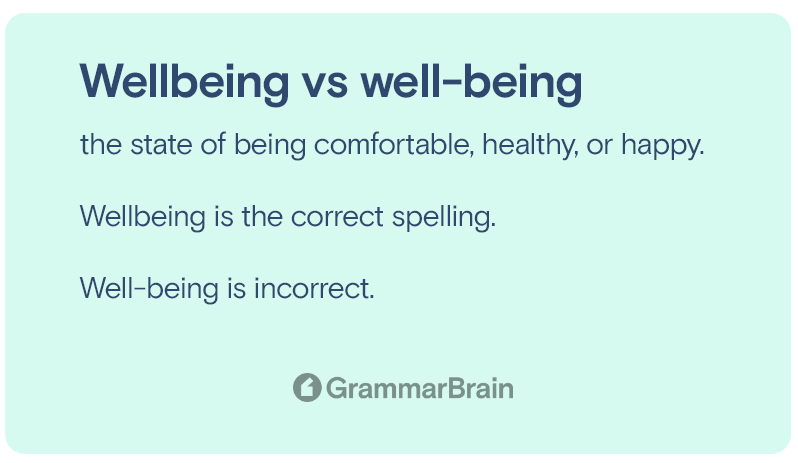As English is a dynamic and rich language, many words develop various spellings over time. The words wellbeing or wellness are one such instance. “Well-being” is an important thing to live a healthy and long life. It is important to learn if you can add a hyphen to the word or not.
Read the article to know how the word is spelled correctly in Canada, USA, and the UK.
| Word | Definition |
| Wellbeing | the state of being comfortable, healthy, or happy. |
Which is Correct? Wellbeing or Well-Being
The correct spelling is “well-being,” thus you can utilize it. Because the word has always been hyphenated, it is believed to illustrate the result of two words combining together to create one. Even though it is rarely utilized, the word “well being” is not the right one and “well being” as two words is also not correct.

What is the difference between wellbeing and well-being?
It’s easy to understand why we misspelled the term “well-being” so often. The reason is the usage of complicated words and hyphens is overruled by some grammar rules. The term “well-being” is not a compound word, which is the secret.
The noun being and the adjective “well” of “well-being” are both utilized. They merge to make a special word that cannot modify another noun. Thus, you need to add a hyphen to show the outstanding idea of “the condition of being healthful.
With terms like physical well-being, psychological well-being, and emotional well-being, we can utilize the word “well-being” to encompass our physical health, life satisfaction, or mental health, based on how complicated the problem is.
The word “well-being” only acquires a compound term in these sentences because physical, psychological, and emotional, are all altering adjectives. Combined sentences that have modifying adjectives are commonly also hyphenated. Nonetheless, the term mental well-being is still up for discussion because this term hasn’t been perceived as a different noun.
Is “Wellbeing” one word?
It’s not common to spell the word “wellbeing” as a single term. The Oxford Dictionary inscribes this word as an option, but it does not certainly imply that it is the best alternative. In most examples, we exclude the hyphen for the sake of plainness, but sometimes it is not right.
Wherever possible, we must adhere to the hyphenated “well-being” regulations. However “wellbeing” as a single term may become more common in the future. It is suggested to stick with the hyphenated form for the well being.
Here is an example:
Incorrect: We should probably talk about your wellbeing.
Correct: My concern is for your well-being. Are there any ways we can help?
What does well-being mean, anyways?
The meaning of the mass noun “well-being” (wlbi) is prosperity, happiness, and the state of health. The noun is the same as the noun wellbeing. However health care experts have a more detailed knowledge of what “well-being” implies to them outside of language sources.
In the UK, is it Well-Being or Well-Being?
British English utilises both well-being and wellbeing interchangeably. However wellness is more preferred. While some spell checkers don’t recognize wellbeing, others do.
Is it Well-Being in Canada or Well-Being?
Several individuals also ponder whether Canada uses one word for wellbeing or two. More individuals use the hyphenated variant, well-being. While well-being is popular in English speaking nations like the UK, Australia, etc. this variant is more common in North America.
Conclusion
It usually consists of one word along with a hyphen. Thoughtfulness is respected in many English speaking nations such as the UK.
The words “wellbeing” or “well-being” are exchangeable. If you’re still skeptical, go for well-being instead of wellbeing!
Inside this article
Fact checked:
Content is rigorously reviewed by a team of qualified and experienced fact checkers. Fact checkers review articles for factual accuracy, relevance, and timeliness. Learn more.
Core lessons
Glossary
- Abstract Noun
- Accusative Case
- Anecdote
- Antonym
- Active Sentence
- Adverb
- Adjective
- Allegory
- Alliteration
- Adjective Clause
- Adjective Phrase
- Ampersand
- Anastrophe
- Adverbial Clause
- Appositive Phrase
- Clause
- Compound Adjective
- Complex Sentence
- Compound Words
- Compound Predicate
- Common Noun
- Comparative Adjective
- Comparative and Superlative
- Compound Noun
- Compound Subject
- Compound Sentence
- Copular Verb
- Collective Noun
- Colloquialism
- Conciseness
- Consonance
- Conditional
- Concrete Noun
- Conjunction
- Conjugation
- Conditional Sentence
- Comma Splice
- Correlative Conjunction
- Coordinating Conjunction
- Coordinate Adjective
- Cumulative Adjective
- Dative Case
- Determiner
- Declarative Sentence
- Declarative Statement
- Direct Object Pronoun
- Direct Object
- Diction
- Diphthong
- Dangling Modifier
- Demonstrative Pronoun
- Demonstrative Adjective
- Direct Characterization
- Definite Article
- Doublespeak
- False Dilemma Fallacy
- Future Perfect Progressive
- Future Simple
- Future Perfect Continuous
- Future Perfect
- First Conditional
- Irregular Adjective
- Irregular Verb
- Imperative Sentence
- Indefinite Article
- Intransitive Verb
- Introductory Phrase
- Indefinite Pronoun
- Indirect Characterization
- Interrogative Sentence
- Intensive Pronoun
- Inanimate Object
- Indefinite Tense
- Infinitive Phrase
- Interjection
- Intensifier
- Infinitive
- Indicative Mood
- Participle
- Parallelism
- Prepositional Phrase
- Past Simple Tense
- Past Continuous Tense
- Past Perfect Tense
- Past Progressive Tense
- Present Simple Tense
- Present Perfect Tense
- Personal Pronoun
- Personification
- Persuasive Writing
- Parallel Structure
- Phrasal Verb
- Predicate Adjective
- Predicate Nominative
- Phonetic Language
- Plural Noun
- Punctuation
- Punctuation Marks
- Preposition
- Preposition of Place
- Parts of Speech
- Possessive Adjective
- Possessive Determiner
- Possessive Case
- Possessive Noun
- Proper Adjective
- Proper Noun
- Present Participle
- Prefix
- Predicate



